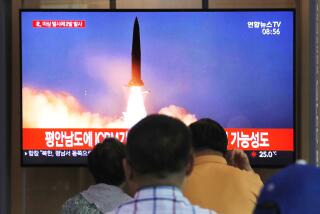U.S. Delay Imperils S. Asia
- Share via
India’s hawks are trying to determine how badly they can hurt longtime foe Pakistan without provoking a nuclear response. Would sending a few thousand troops into the part of Kashmir controlled by Pakistan, destroying training camps, be below the flashpoint? What about invading a city in Pakistan itself? How about a quick attack and withdrawal?
The truth is, no one knows the point where the nuclear genie would come out of the bottle. But we do know that the time to dispatch a high-ranking U.S. diplomat like Deputy Secretary of State Richard Armitage to India and Pakistan is now, not in early June as is planned.
India’s prime minister added to the urgency Wednesday when he told soldiers in Kashmir they had to be “ready for sacrifice” and proclaimed it was “time to fight a decisive battle.” India and Pakistan have a million troops along their border. Last week, India expelled the Pakistani ambassador and shifted its paramilitary forces from civilian to military control, ominous signs.
Britain’s foreign secretary, Jack Straw, is due to visit India and Pakistan next week, but an envoy from the former colonial master of South Asia doesn’t carry the clout of a U.S. emissary. As in the Middle East, waiting will surely present Washington with a worse situation later.
Kashmir was the trigger of two of the three wars India and Pakistan have fought since becoming independent from Britain in 1947. Both nations tested nuclear weapons in 1998, raising the stakes in any conflict.
The current military buildup dates to December’s attack on the Indian Parliament in New Delhi, in which five attackers and nine Indians were killed. India said the assailants belonged to two Pakistani groups. Last week, separatist attackers struck an army camp in Jammu, killing more than 30 people, mostly women and children. India again said the assailants, who were killed, were Pakistanis.
Pakistan admits to supporting Kashmiri movements for independence but implausibly denies that it looks the other way when guerrillas cross from Pakistan into Kashmir.
Previous threats of war prompted President Bush to telephone the leaders of both countries. Secretary of State Colin L. Powell visited New Delhi and Islamabad. That diplomacy played a large part in reducing tensions to a more tolerable level.
India faults Washington for not putting more pressure on Pakistani President Pervez Musharraf, its ally in the war in next-door Afghanistan.
India may understand the folly of trying to guess where the nuclear line is drawn. But British Foreign Secretary Straw aptly characterized the tensions as “a crisis the world cannot ignore.” Washington needs to get more deeply involved more quickly.
More to Read
Sign up for Essential California
The most important California stories and recommendations in your inbox every morning.
You may occasionally receive promotional content from the Los Angeles Times.










